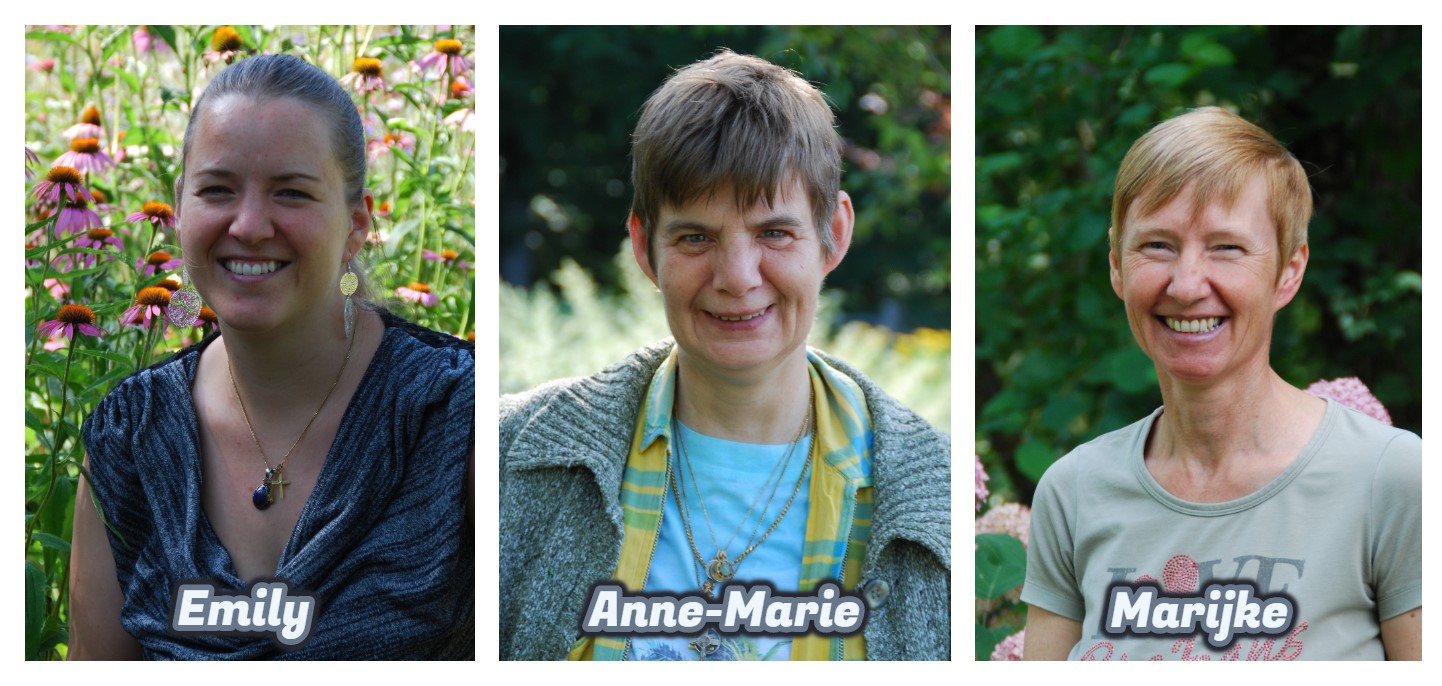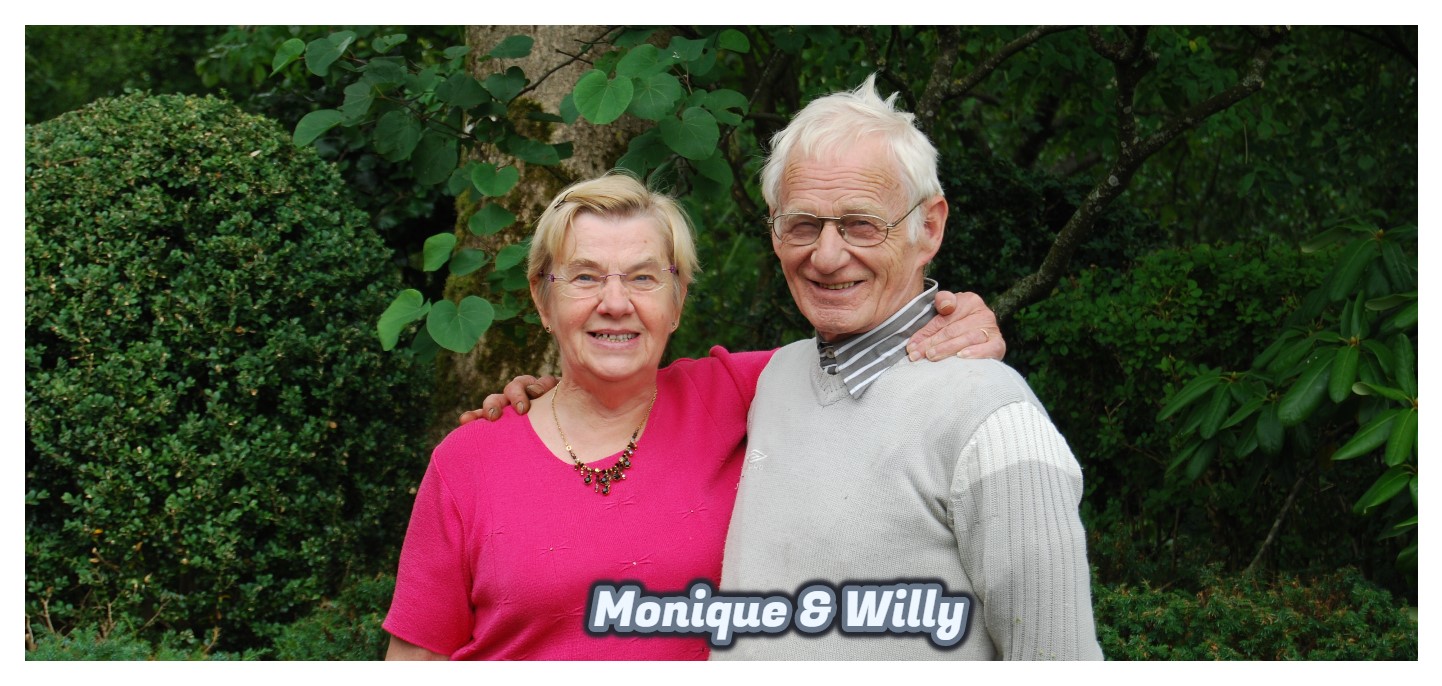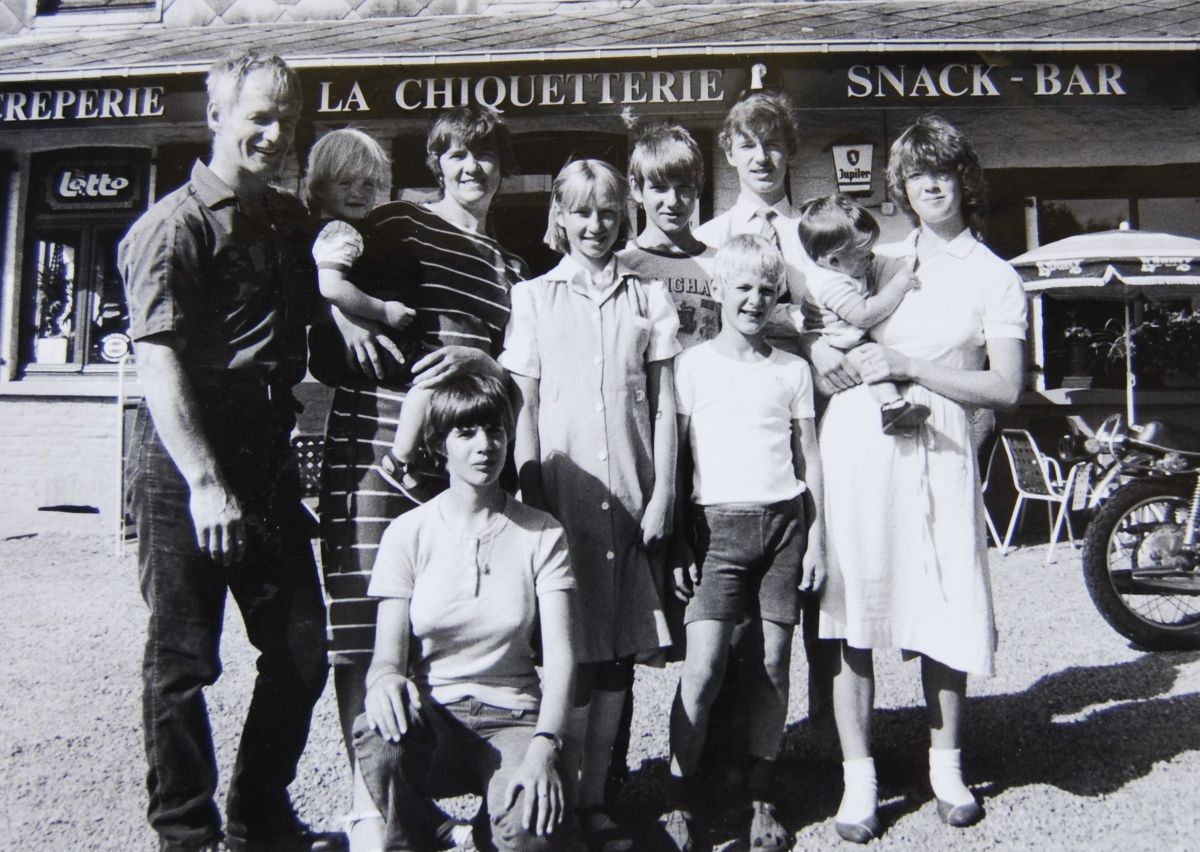Over ons


ONS VERHAAL
Willy Van Wesemael en Monique Paelstermans, uit Hofstade bij Aalst, hadden eind jaren '70 een grote droom om ergens in de Pyreneeën een geitenboerderij op te richten waar ze samen met hun kinderen geitenkaas konden maken en een kruidentuin bewerken. Willy was immers als kind opgevoed door de nonnen die hem de grondbeginselen bijbrachten van kruiden- en plantengeneeskunde. Zijn interesse was gewekt en hij is nooit gestopt met leren en experimenteren.
Het idee om naar de Pyreneeën te trekken is door verschillende hinderpalen niet door kunnen gaan, maar het zorgde ervoor dat ze verder op zoek gingen in België naar een geschikte locatie.
Nafraiture (Vresse-sur-Semois)
In 1981 huurde het gezin een vakantiewoning in Bohan (Vresse-sur-Semois) om de was en de strijk te doen en toch wel een beetje rust te vinden na een lange rit in een volgeladen camionette. Op een dag ontdekte Willy samen met zijn oudste zoon John 'La Chiquetterie' een herberg uit de 19e eeuw in Nafraiture. Het was een vervallen en uitgeleefd gebouw dat al 7 jaar onbewoond was en waar smokkelaars zaakjes deden die het daglicht niet konden verdragen. Het gebouw stond samen met anderhalve hectare grond voor een spotprijs te koop. Willy zag er, ondanks de grote renovatiewerken die dienden te gebeuren, toch potentieel in om hun droom te verwezenlijken.
Willy en Monique namen contact op met de eigenaar van het pand, maar toen stootten ze al op een eerste obstakel: hij wilde niet verkopen aan Vlamingen.
Na heel wat gesprekken en door zijn verleden als paracommando, wist Willy de eigenaar uiteindelijk toch te overtuigen om aan hen te verkopen. Willy en Monique kochten La Chiquetterie en sprongen samen met hun 6 kinderen (Cathy, John, Anne-Marie, Marijke, Wim en Pieter) het avontuur tegemoet. In januari 1982 mocht het gezin nog een zevende kindje verwelkomen: Emily.

Moeizame start
De start verliep echter zéér moeizaam. Er was geen elektriciteit in de woning en de bestaande waterput was ontoereikend voor hun waterverbruik. Ze kregen af en toe drinkwater van enkele boeren uit de buurt, maar ook dit kon niet blijven duren. De elektriciteitsmaatschappij wilde echter deze afgelegen woning niet aansluiten op het elektriciteitsnet en de gemeente wilde de aanleg van de waterleiding niet realiseren.
Tevens werden ze door de streekbewoners met weinig sympathie ontvangen. Ze werden gezien als goudzoekers en als uitschot behandeld. Er waren onbekende pestduivels en dieven. Zelfs de toenmalige burgemeester wilde het gezin geen enkele steun of hulp geven.
Ook de kinderen hadden het moeilijk op school, want ondanks dat de buurtschool door hun komst open kon blijven, waren die Vlamingen toch niet welkom.
Strijdvaardige Vlamingen
Ondanks alle moeilijkheden bleef het gezin niet bij de pakken zitten, maar gingen ze strijdvaardig op zoek naar oplossingen!
Ze contacteerden alle mogelijk instanties die hen konden helpen om de woning te laten aansluiten op het water- en elektriciteitsnet. Ze schreven zelfs een brief naar minister Wathelet en koning Boudewijn om hen te helpen. Jammer genoeg zonder resultaat. Ze pakten het lot in eigen handen. Met behulp van een wichelaar gingen ze op zoek naar een plaats waar er water op het land te vinden was. In de weide vooraan boorden ze tot 40 meter diep en vonden ze een bron van drinkbaar water met een voldoende groot debiet.
Door het installeren van een alternator die met stookolie werd aangedreven, kon de woning van elektriciteit voorzien worden. Ze moesten gerantsoeneerd omspringen met elektriciteit, maar ook dat had zijn charmes wanneer om 19 uur de alternator afgezet werd en er met kaarsen verlicht werd.
Het heeft uiteindelijk nog tot 1995 geduurd alvorens La Chiquetterie mee aangesloten kon worden op het lokaal water- en elektriciteitsnet door de nationalisering van de elektriciteitsmaatschappij en mits het betalen van meer dan één miljoen Belgische frank (red. 25.000 euro).
De eerste klanten
Om in hun eigen levensonderhoud te voorzien kweekten ze van in het begin hun eigen groente en hielden ze kippen en varkens, maar er moest ook geld in het laatje komen. Om de kost te verdienen openden ze zo snel mogelijk La Chiquetterie als een uniek pannenkoekenhuisje waarbij ze ook de eerste stappen zetten naar een kruidentuin en geitenkwekerij.
De allereerste klanten waren Vlamingen uit Linkeroever (Antwerpen) en sporadisch stopten toevallige voorbijgangers om een pannenkoek te eten en iets te drinken. Dit was echter niet voldoende om te kunnen overleven. Het was ook heel moeilijk om cliënteel op te bouwen binnen de lokale gemeenschap door de grote weerstand tegen 'die Vlamingen'.
Alles heeft een reden
Er kwam echter verbetering door 3 broeders die als bij toeval stopten in La Chiquetterie. Zij zochten een plaats waar ze terecht konden om iets te eten en te drinken met 2 bussen bedevaarders. Door het kruisbeeld dat aan de muur hing, waren zij er van overtuigd dat het een teken van God was dat ze terug moesten komen om dit gezin met 7 kinderen te zorgen.
Dat kruisbeeld hing er niet zomaar. Pieter, de jongste zoon van het gezin, had van de voormalige eigenaar van La Chiquetterie een geschenk mogen kiezen uit zijn antieke prullaria. Het gekozen kruisbeeld (dat er nog steeds hangt) hadden Willy en Monique als souvenir opgehangen in het café. Wie had ooit kunnen denken dat dit beeld hun redding zou kunnen zijn. Sindsdien kwamen de broeders maandelijks met 3 à 4 bussen bedevaarders langs en zorgde voor een regelmatig inkomen. De broeders hadden heel wat sympathie voor het gezin dat het moeilijk had om te overleven en brachten daarom ook overschotten mee van de plaatselijke markt. Ze verzamelden ook kleding, voedsel en benodigdheden om het gezin te helpen.
De grote verandering
In 1983 nam Monique contact op met Martin De Jonghe van Radio 2 tijdens zijn programma 'Servicetelefoon' op zondagochtend. Ze kaartte de problemen aan waar het gezin mee te maken had en naar aanleiding hiervan nam er een journalist van Het Laatste Nieuws met hen contact op en publiceerde een groot artikel: "Vlaamse koppigaard hield prachtig stand in Wallonië".
De publicatie van dit artikel zorgde ervoor dat er heel wat nieuwsgierige Vlamingen met de krant onder de arm, de weg vonden naar La Chiquetterie. Dat was een grote verademing na twee heel moeizame jaren.
De kruiden
In 1984 ging Willy van start met het organiseren van kruidenwandelingen waardoor La Chiquetterie extra klanten trok. Hij had op dat moment zo'n 60 verschillende kruiden in de tuin.
Met deze kruiden zette hij ook zijn eerste stappen naar het brouwen van een eigen likeur. Met vodka uit de Aldi en planten uit eigen tuin maakte hij Elixir de Nafraiture. De Elixir werd goed gesmaakt bij de klanten en was een mooie extra bron van inkomsten voor hun zaak.
Hoeveel Willy ook wist van kruiden en het brouwen van een Elixir, hij had helemaal geen kaas gegeten van de verplichtingen die hij moest volgen wanneer je sterke drank brouwt en verkoopt. Toen de accijnzendienst op een dag controle kwam doen, dreigde dit dan ook het einde te worden van Elixir de Nafraiture.
De controleurs zagen echter dat Willy en zijn familie niet van kwade wil waren en waren bereid om hem te begeleiden in het nemen van de juiste stappen. Op die manier kon hij op een correcte manier Elixir maken, waarbij hij ook wettelijk met alles in orde was. Drie jaar lang kwamen de controleurs van de accijnzendienst maandelijks langs om Willy te helpen in dit hele proces.
Met een nieuwe naam, enkele wijzigingen aan het originele recept en geheel volgens de wettelijke voorschriften, werd in 1987 de eerste fles Elixir de Vresse gebotteld. Een succesvolle likeur waar van in het begin zo'n 1500 flessen per jaar over de toonbank gaan.
De grote kennis van Willy over kruiden was ook de controleurs niet ontgaan. Het was op hun aanraden dat Willy in 1987 ook kruidentinctuurs is gaan maken.
Van pannenkoekenhuisje naar wilde kruidentuin en zoveel meer
La Chiquetterie is op vandaag uitgegroeid tot de kruidentuin van Nafraiture waar zo'n duizend verschillende soorten kruiden en bomen in perfecte harmonie groeien en iedereen welkom is voor raad en advies over het gebruik van medicinale kruiden.
Ze hebben hun eigen huisgemaakte kruidenlikeuren, moedertincturen, siropen, enz. De geitenkwekerij telt ondertussen zo’n 60 geiten die voor heerlijke geitenkaas zorgen, dagelijks wordt er vers brood gebakken en de kippen zorgen nog steeds voor eitjes om de heerlijkste pannenkoeken te bakken
In de beginjaren waren enkel Vlamingen het cliënteel van La Chiquetterie, maar gaandeweg won de familie Van Wesemael ook het vertrouwen van de streekbewoners. Ondertussen zijn ze helemaal aanvaard in de gemeenschap van het dorp en zelfs een vaste waarde geworden in de streek. Er komen nog steeds veel Vlamingen over de vloer, maar ze zijn zeker niet meer het enige cliënteel. Waal, Vlaming, wereldburger, …. iedereen is welkom in ‘La Chiquetterie’.
Familiebedrijf
Van in het begin is de zaak een echt familiebedrijf geweest. Wanneer de kinderen niet naar school moesten, hielpen ze allemaal mee in de zaak. John stond achter de bar, Kathy en Anne-Marie hielpen in de keuken, Wim en Pieter hielden zich bezig met de tuin en de geiten. Marijke verdiepte zich het liefst in de kruiden en Emily volgde in haar voetsporen.
Naarmate de kinderen ouder werden, trouwden en zelf kinderen kregen, sloegen sommige hun eigen weg in, anderen bleven meedraaien in de zaak.
Een nieuw hoofdstuk
Bijna 40 jaar lang zijn Willy en Monique de draaiende spil geweest in de zaak en ook vandaag zijn ze nog steeds een vaste waarde in de zaak. Gaandeweg hebben ze wel heel wat zaken over gelaten aan hun kinderen die nog steeds in de zaak actief waren.
Marijke staat aan het hoofd van de productie van de kruidenproducten en hun ontwikkeling. Emily zorgt voor de verkoop en rondleidingen door de tuin. Samen zorgen ze voor het versturen van de bestellingen en ontvangen de klanten in het café die ze naast het geven van een lekker streekbiertje of misschien wel een Elexir de Vresse, ook advies geven over het gebruik van de kruiden. Anne-Marie zorgt voor heerlijke koffie, kruidenthee en lekkere pannenkoeken. De geitenkaas wordt gemaakt door Wim en hij bakt ook elke dag vers brood.
In 2019 was voor Willy en Monique de tijd gekomen om ook officieel de fakkel over te dragen. Emily Van Wesemael, de jongste dochter van het gezin, heeft de zaak overgenomen. Zij zal samen met Marijke, Anne-Marie en Pieter de familiezaak verder zetten en ze zit boordevol vernieuwende ideeën om de zaak verder te doen groeien.
En geen stress, Willy en Monique zullen niet ver weg zijn.
